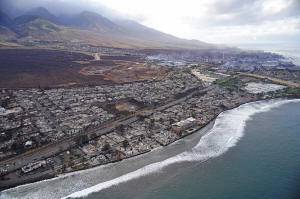A $4B settlement for Hawaii wildfire victims is in legal limbo as an
unusual trial starts
 Send a link to a friend
Send a link to a friend
 [January 29, 2025]
By JENNIFER SINCO KELLEHER [January 29, 2025]
By JENNIFER SINCO KELLEHER
HONOLULU (AP) — When Hawaii Gov. Josh Green announced a $4 billion
settlement about a year after the deadliest U.S. wildfire in a century
devastated Lahaina in 2023, he touted the speed of the deal to “avoid
protracted and painful lawsuits.”
Five months later, however, an unusual trial starting Wednesday will
delve into difficult questions about survivors’ losses as a judge
decides how to divide the settlement. Some victims will take the witness
stand, while others have submitted pre-recorded testimony, describing
pain made all the more fresh by the recent destruction in Los Angeles.
The trial won't determine fault. Defendants blamed for the blaze
including the state, power utility Hawaiian Electric and large
landowners have already agreed to the settlement amount.
At issue is how much money various groups of plaintiffs might receive,
including some who filed individual lawsuits after losing their family
members, homes or businesses, and other victims covered by class-action
lawsuits, including tourists who simply had to cancel trips to Maui
following the inferno.
Lawyers for the two groups failed to come to an agreement, leaving it up
to Judge Peter Cahill to determine how the $4 billion should be shared.

“A class action is everybody suffering the same loss,” said Damon
Valverde, whose Lahaina sunglasses company burned. “And I suffered quite
a bit more than others, and others suffered quite a bit more than me.”
Valverde isn't expected to testify; the focus should be on victims who
lost family members, he said.
Those include Kevin Baclig, whose wife, father-in-law, mother-in-law and
brother-in-law were among the 102 people known to have died.
Baclig said in a declaration that if called to testify he would describe
how for three agonizing days he searched for them — from hotel to hotel,
shelter to shelter. “I clung to the fragile hope that maybe they had
made it off the island, that they were safe,” he said.
A month and a half went by and the grim reality set in. He went to the
Philippines to gather DNA samples from his wife’s close relatives there.
The samples matched remains found in the fire. He eventually carried
urns holding their remains back to the Philippines.
[to top of second column]
|

Wildfire wreckage is shown in Lahaina, Hawaii, Aug. 10, 2023. (AP
Photo/Rick Bowmer, File)

“The loss has left me in profound, unrelenting pain,” he said.
“There are no words to describe the emptiness I feel or the weight I
carry every day.”
The class action includes some people who lost homes and businesses,
but also tourists whose trips were delayed or canceled. Only a
nominal portion of the settlement should go toward that group, said
Jacob Lowenthal, one of the attorneys representing victims — like
Baclig — who have filed their own lawsuits, known as the "individual
plaintiffs.”
“The categories of losses that the class is claiming are just
grossly insignificant compared to our losses,” Lowenthal said.
Attorneys representing the class didn't respond to messages from The
Associated Press. In their trial brief, they challenged the idea
that everyone who has a claim worth suing over has already done so.
Many people have held off hiring attorneys, the brief said, because
of the fire's disruption to life, "distrust in heavy attorney
advertising, and a desire to see how the process plays out first.”
Further complicating the matter are questions before the state
Supreme Court, which is considering whether insurers can separately
sue the defendants for reimbursement for the $2 billion-plus they
have paid out as a result of the fire, or whether their share must
come from the $4 billion settlement.
If the court says insurers can sue separately, that will likely
torpedo the entire deal. Preventing insurers from going after the
defendants is a key settlement term, and allowing them to do so
would drain the money available for fire victims and lead to
prolonged litigation, lawyers for the individual plaintiffs say.
All contents © copyright 2025 Associated Press. All rights reserved
 |